It was a very rainy Saturday for our Green Gymmers this week as we set off for
Boundary House Fen, but the weather (and indeed the fen itself) was no match for
our wellies, raincoats, and waterproof trousers! After the team had assembled we
were given a quick briefing by the day's noble leader, Sally, and the capable
Rod D'Ayla, guardian of this patch of fen. Rod explained that he had been doing
some reed cutting and was starting to dig some new ditches to divert the water
where it is most needed - a task which has no end. Our job, then, was to rake up
the cut reeds and transport them to where they were needed to plug some deeper
sections of water. Two able scythers, Jim and Adrian, were also on hand to
continue the reed cutting efforts.
While it was very wet, everyone did an
excellent job of pulling together rake, bag, and drag the reeds into the right
place. We were also joined by Judy Webb, who was collecting fungi samples for an
event at Harcourt Arboretum. Even though it has been too dry and hot for many
mushrooms and toadstools to really get going yet, Judy's eagle-eye quickly
spotted them and she ended up with a lovely basketful of fungi to show-and-tell.
At break time, Eleanor and Graham told us all about the apple juice they had
been making from donated apples from the local community and recycled bottled.
Demand for these was high, so they're going to come back next week armed with
bottles to sell us. Judy and Sally had also brought along some plantlings which
some of the Green Gym team had offered to grow on. These were from two plants -
cotton grass and maiden pink - both of which are extremely rare, and which need
replanting to various sites across Oxfordshire.
After break it was back to work
and it was, if anything, even wetter than when we started. Judy also began
pulling up some of the dead biennial marsh lousewort. This plant is an excellent
'ecosystem engineer': it is a parasitic plant which latches on to sedges and rushes and stunts their growth, allowing for other species to
establish and grow and, in Judy's words, 'control the ecological balance in
meadow plant communities' (you can read all about this in a piece by Judy here:
https://freshwaterhabitats.org.uk/wp-content/uploads/2020/07/Marsh-louse-wort-as-an-ecosystem-engineerV3-JW-July-2020for-OFP.pdf).
These cut marsh lousewort were being stored in a drag bag and then would be
spread out when their seeds could germinate, as Judy had found that they didn't
have much luck when left to their own devices at this time of year.
At the end
of the day we all gathered underneath a big tree to check we hadn't left any
equipment to the sucking influence of the fen, and to bid one another goodbye.
Hot drinks, a bath, and a big lunch for each of us, I think.
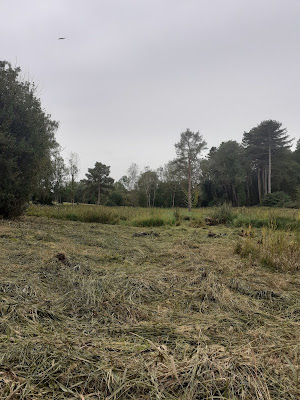 |
| Boundary House Fen, with freshly cut reeds |
 |
| Team briefing |
 |
| Filling drag bags whilst supporting a variety of wet weather gear |
 |
| Weather fit for snails |
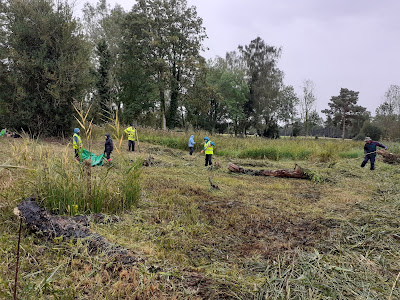 |
| Team work across the fen |
 |
| Girls just wanna have f...ull drag bags of reeds |
 |
| A knotgrass moth caterpillar? |
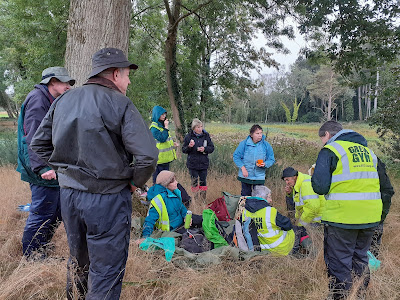 |
| Breaktime! |
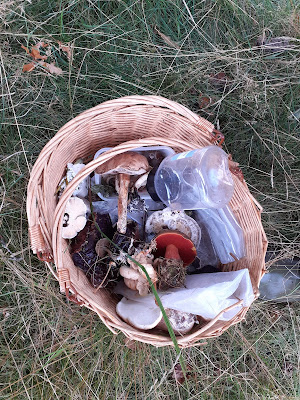 |
| Judy's fungi haul! |
 |
| A particularly fine specimen |
 |
| Scything masters at work |
 |
| This photo does not show you Adrian's rescue of me as I got stuck in the mud |
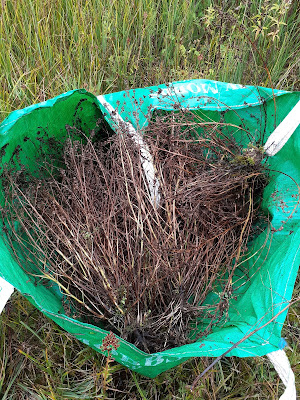 |
| Marsh lousewort |
 |
| The final push |
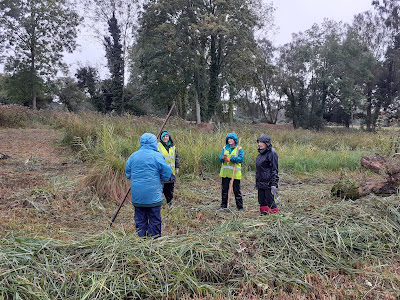 |
| Important discussions |
 |
| The finished (for now) product |



















Comments
Post a Comment